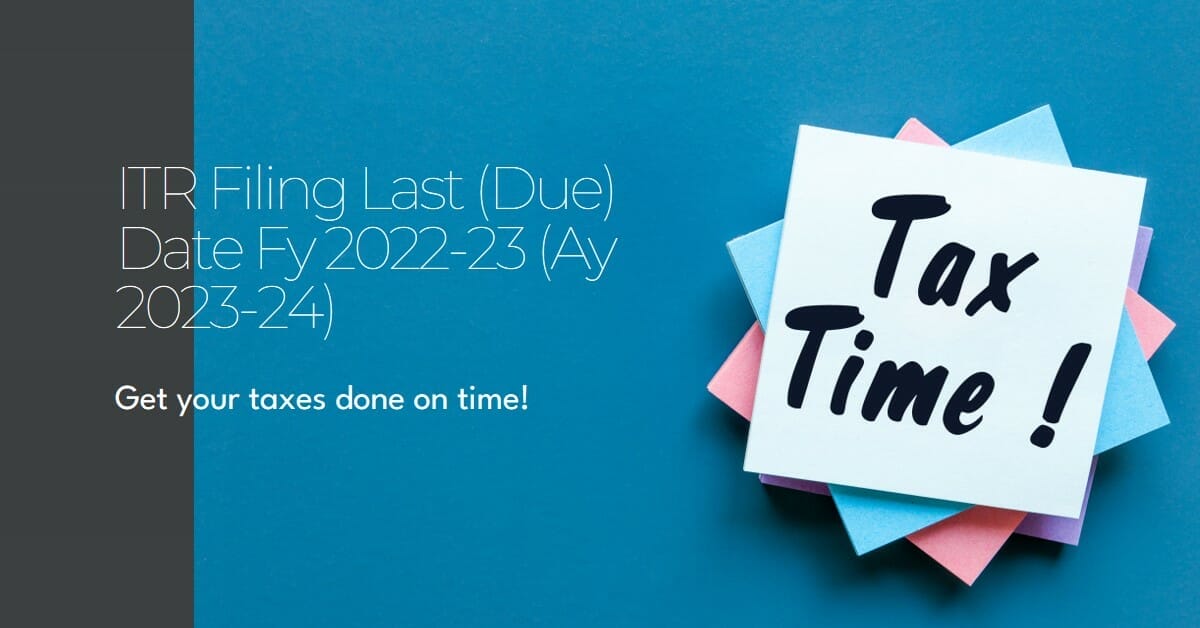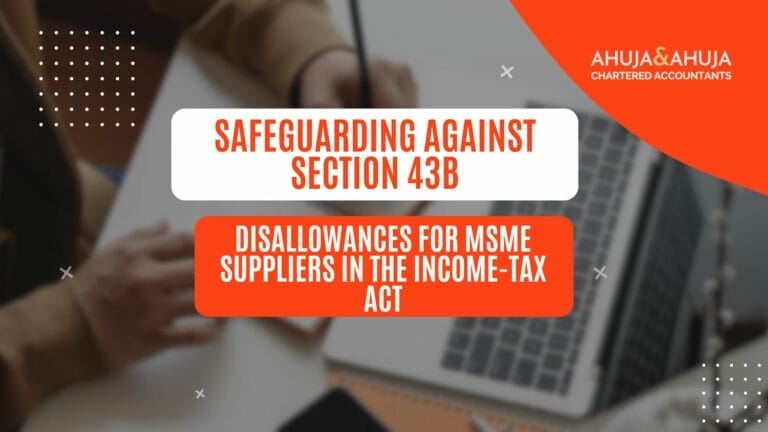ITR Filing Last (Due) Date Fy 2022-23 (Ay 2023-24)
The Income Tax Return (ITR) filing deadline for the Financial Year 2022-23 (FY 2022-23) is fast approaching, with a due date of July 31, 2023. The Assessment Year (AY) for FY 2022-23 is 2023-24, during which taxpayers file their returns and declare their investments. It is essential to adhere to the filing deadline, as late filing can lead to interest and penalty charges.
For individuals, businesses, trusts, and companies, proper documentation and timely filing of ITRs are crucial to avoid legal consequences. The tax laws and regulations pertaining to ITR filing are complex, and it is essential to understand the deadlines, penalties, and fees associated with it.
This article aims to provide an overview of the important dates and regulations related to ITR filing for FY 2022-23 (AY 2023-24) and help taxpayers comply with them. If you need assistance with ITR filing, our team at Income Tax Return Filing Services can help you navigate the complexities of the tax system. We also offer faceless assessment services to help you avoid legal issues and disputes with the tax authorities.
Key Dates and Deadlines
The key dates and deadlines for filing income tax returns (ITRs) for FY 2022-23, including the last date for filing ITR without late fee and the due dates for businesses requiring audit and transfer pricing reports, are important to note for individuals and entities in India.
The due date for filing ITR without late fee is July 31, 2023. Taxpayers who file their returns after the due date will have to pay interest under Section 234A and penalty under Section 234F.
For individuals, Hindu Undivided Families (HUFs), Association of Persons (AOPs), and Body of Individuals (BOIs), the due date for filing ITR is July 31, 2023. However, businesses requiring audit have a due date of October 31, 2023, while businesses requiring transfer pricing reports have a due date of November 30, 2023. Revised returns can be filed until December 31, 2023.
It is important to note that late filing of ITR will attract a late fee of Rs. 5,000 under Section 234F, which is reduced to Rs. 1,000 for total income less than Rs. 5 lakh.
In addition to the due dates for filing ITR, it is also important to note the due date for paying advance tax instalments for FY 2023-24. Furthermore, income tax refund can be claimed by filing belated return with penalty of Rs. 5,000 or Rs. 1,000 if total income less than Rs. 5 lakh. While income tax can still be paid after the due date, late filing penalty and interest will be levied.
It is worth noting that Section 139(4) allows for filing of belated return with penalty of up to Rs. 5,000 for delay. Trusts and companies have a specified due date for filing ITR, and income tax audit is required for certain types of assesses with turnover exceeding Rs. 1 crore or receipts above Rs. 50 lakh.
Late Filing Penalties
Penalties are imposed for late submission of income tax returns, including interest under Section 234A and penalty under Section 234F, which vary depending on the total income earned and the time of filing.
Under Section 234F of the Income Tax Act, a late filing penalty is levied on taxpayers who file their returns after the due date. The penalty for late filing is Rs. 5,000 if the return is filed after the due date but before December 31, 2023, and Rs. 10,000 if the return is filed after December 31, 2023.
In addition to the late filing penalty, interest under Section 234A is levied on the unpaid tax amount for late filing. The interest is charged at the rate of 1% per month or part of the month on the unpaid tax amount. Taxpayers are required to pay the interest along with the tax amount at the time of filing the return.
Taxpayers should note that a belated return can be filed after the deadline, but the late fee and interest will still be applicable. Also, losses declared in the belated return cannot be carried forward for set-off against future income.
Therefore, it is important to file the return before the deadline to avoid any penalties and interest charges.
Interest and Fees
Interest and fees are critical factors that taxpayers should consider when filing their income tax returns. If a taxpayer files their tax return after the due date, they will be required to pay interest under Section 234A and a late fee under Section 234F.
The interest charged under Section 234A is levied on the unpaid tax amount at a rate of 1% per month for each month of delay. It is essential to note that the interest is calculated from the due date of filing the return until the date of actual filing.
Additionally, a late fee under Section 234F is also imposed if the tax return is filed after the due date. The late fee is Rs. 5,000 if the return is filed after the due date but on or before December 31 of the assessment year. However, if the total income of the taxpayer is less than Rs. 5 lakh, the late fee is reduced to Rs. 1,000.
It is crucial to note that the late fee should be paid before the filing of the tax return. Failure to pay the late fee may result in the return being considered defective.
In conclusion, taxpayers should be mindful of the interest and fees associated with filing their income tax returns. The penalty for late filing can be significant, and interest under Section 234A can also add up if the return is filed after the due date. Therefore, taxpayers should ensure that their tax returns are filed within the due date to avoid any penalty or interest charges.
Loss Adjustment Rules
Loss adjustment rules play a significant role in income tax returns as they allow taxpayers to adjust their losses and carry them forward to future years. In case a taxpayer has declared losses in their ITR, they can adjust those losses against their income in the same financial year and reduce the tax liability. If the losses are higher than the income, the taxpayer can carry forward the unadjusted losses to the next financial year and set them off against the income of future years. However, it is important to note that losses can only be adjusted if they are declared in the ITR filed before the deadline.
The loss adjustment rules also have certain limitations. For instance, if a taxpayer files their ITR after the due date, they cannot carry forward the losses. Additionally, if the losses are not declared in the ITR filed before the deadline, they cannot be adjusted against the income of future years. Hence, it is crucial for taxpayers to file their ITR on time and declare all their losses accurately.
In case a taxpayer has missed the deadline to file their ITR, they can still file a belated return. However, in such cases, they will not be allowed to carry forward the losses, and they will have to pay a late filing fee and interest on the unpaid tax amount. Therefore, it is advisable for taxpayers to file their ITR on time and accurately declare all their losses to avoid any penalties or interest in the future.
Advance Tax Instalments
Taxpayers with significant income should be mindful of the due date for paying their advance tax instalments, as failing to pay these instalments on time may result in additional tax liability.
Advance tax is a mode of paying tax on an ongoing basis, rather than waiting for the end of the financial year. Taxpayers are required to pay advance tax if their tax liability exceeds Rs. 10,000 in a financial year.
Failure to pay advance tax on time may result in interest under Section 234B and 234C of the Income Tax Act.
The due date for paying advance tax instalments is critical as it affects the interest payable on any tax amount that is not paid on time. If you miss the first due date of June 15, you can still pay the required instalment by the second due date of September 15. The third instalment is due by December 15 and the fourth by March 15.
It is important to note that the advance tax paid must be at least 75% of the estimated tax liability for the financial year. Failing to pay the required amount on time may result in additional interest and penalties.
It is recommended that taxpayers estimate their tax liability for the financial year and pay the advance tax instalments on time to avoid any additional tax liability. If you underestimate your tax liability and miss paying the required instalments on time, you may face interest and penalties under the Income Tax Act.
Taxpayers can use the income tax calculator available on the Income Tax Department’s website to calculate their estimated tax liability and plan their advance tax payments accordingly.
Income Tax Refunds
One way to address potential overpayment of income tax is by claiming refunds, which can be done by filing a belated return with the appropriate penalty fee. If an individual has paid more tax than necessary, they can claim a refund by filing a belated return within the applicable deadline. The penalty fee for filing a belated return is Rs. 5,000 or Rs. 1,000, depending on the individual’s total income.
To provide a better understanding, the table below shows the penalty fee for filing a belated return:
| Total Income | Penalty Fee |
|---|---|
| Less than Rs. 5 lakh | Rs. 1,000 |
| More than Rs. 5 lakh | Rs. 5,000 |
It is important to note that income tax refunds are only applicable if the individual has paid more tax than necessary. If the individual has not paid enough tax, they will be required to pay the remaining amount along with any applicable penalty fees and interest. Additionally, filing a belated return after the applicable deadline will result in late filing penalty and interest levied, which can increase the overall amount owed to the government.
In conclusion, if an individual has paid more tax than necessary, they can claim a refund by filing a belated return with the appropriate penalty fee. It is important to file the return within the applicable deadline to avoid additional penalty fees and interest. However, if the individual has not paid enough tax, they will be required to pay the remaining amount along with any applicable penalty fees and interest.
Belated Returns
Belated return filing is subject to penalty fees and interest levied by the government. If an individual or business misses the due date for filing their Income Tax Return (ITR), they can still file a belated return. However, they will have to pay a penalty fee of up to Rs. 5,000 under Section 234F of the Income Tax Act, 1961, for late filing. This fee is reduced to Rs. 1,000 if the total income is less than Rs. 5 lakh.
In addition to the penalty fee, interest under Section 234A of the Income Tax Act, 1961, is also levied on the unpaid tax amount for late filing. The interest rate is 1% per month, calculated from the due date of filing ITR until the date of actual filing. It is important to note that if the belated return is filed after the due date, losses cannot be carried forward. Therefore, it is crucial to file the ITR before the deadline to avoid any penalty fees or interest.
To avoid penalties and interest, taxpayers should file their ITR within the due date. However, in case of missed deadline, they can still file a belated return until December 31, 2023. It is important to keep in mind that the due date for paying advance tax instalments for FY 2023-24 is also crucial.
Furthermore, if an individual or business is looking to claim an income tax refund, they can do so by filing a belated return with a penalty of Rs. 5,000 or Rs. 1,000 if their total income is less than Rs. 5 lakh.
Income Tax Audit
The Income Tax Audit is a crucial process for certain types of assesses with turnover exceeding Rs. 1 crore or receipts above Rs. 50 lakh, as it helps ensure compliance with tax laws and fairness in the tax system.
Here are four important points to note about the Income Tax Audit:
- The audit is conducted by a Chartered Accountant appointed by the taxpayer and approved by the Income Tax Department.
- The auditor examines the taxpayer’s financial records, books of accounts, and other relevant documents to check for accuracy and completeness.
- The audit report is submitted to the Income Tax Department, which may accept or reject the findings and take appropriate action.
- Failure to comply with the audit requirements can result in penalties and legal action.
Overall, the Income Tax Audit is an essential tool in maintaining the integrity of the tax system and ensuring that taxpayers are paying their fair share.
It is important for assesses to be aware of their obligations and to keep accurate records to avoid any issues during the audit process.
For Any Query
Frequently Asked Questions
Can I file my ITR for FY 2022-23 after the due date of July 31, 2023?
Filing ITR after the due date of July 31, 2023 for FY 2022-23 attracts interest under Section 234A and penalty under Section 234F. A belated return can be filed, but late fee and interest still apply, and losses cannot be carried forward.
What is the penalty for not paying advance tax instalments for FY 2023-24?
Non-payment of advance tax instalments for FY 2023-24 attracts interest under Section 234B and 234C. The interest rate is 1% per month on the shortfall of tax paid as per the specified instalment dates. Penalty is not applicable for non-payment of advance tax.
Is it possible to carry forward losses if I file a belated return?
Loss adjustment is only permitted if losses are declared in the ITR and filed before the deadline. Belated returns can still be filed after the deadline, but losses cannot be carried forward.
Are there any exemptions for late filing penalties or interest under Section 234A?
There are no exemptions for late filing penalties or interest under Section 234A of the Income Tax Act. Taxpayers filing returns after the due date are liable to pay interest and penalty as per the provisions of the Act.
What is the penalty for filing a revised return after the due date?
The penalty for filing a revised income tax return after the due date is Rs. 5,000 if the return is filed by December 31, 2023. However, if the return is filed after December 31, 2023, the penalty may be up to Rs. 10,000.
Our Locations
Disclaimer
The materials provided herein are solely for educational and informational purposes. No attorney/professional-client relationship is created when you access or use the site or the materials. The information presented on this site does not constitute legal or professional advice and should not be relied upon for such purposes or used as a substitute for professional or legal advice.



